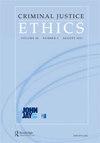Breaking Laws, Just and Unjust
Q2 Social Sciences
引用次数: 0
Abstract
Can a state punish citizens for breaking unjust laws? In his engaging defense of democratic political authority, Stephen P. Garvey answers affirmatively. Guilty Acts, Guilty Minds sets up a debate between philosophical anarchists, who think that a state can punish lawbreakers only if its laws are just, and statists, who think that a state can punish lawbreakers even if its laws are unjust. Garvey defends a version of statism that recognizes democratic political authority and defines the limits of this authority using the concepts of actus reus (guilty act) and mens rea (guilty mind). Guilty Acts, Guilty Minds provides an accessible overview of major issues in criminal and moral thought, exploring the terrain with nuance and care. The book uses real cases as starting points for discussions of issues such as insanity, duress, and incapacitation. Garvey writes for non-specialists, avoiding jargon and relegating his debates with other scholars to the footnotes, successfully pointing those looking for more detail and argumentation to the relevant scholarly literature. His larger aim—to draw the bounds of state authority using the concepts of actus reus and mens rea—is refreshingly novel and topical, especially at a time where many are wondering how state action can be legitimate when its laws are unjust. Garvey’s defense of democratic authority will spur discussions among his readers about what those limits ought to be —whether they agree with him or not. The book is divided into six chapters. Chapter 1 sketches the debate between the anarchists and statists. Chapters 2, 3, and 4 provide an overview of the actus reus and mens rea requirements for crimes committed knowingly and unknowingly. Chapter 5 covers the insanity defense. Chapter 6 returns to the debate between anarchists and statists. Chapter 1 defends a version of statism. Contra the philosophical anarchist, who “makes no distinction between justice and legitimacy,” the statist recognizes that the state can Sarah W. Hirschfield, Email: sarah.w. hirschfield@gmail.com Criminal Justice Ethics, 2021 Vol. 40, No. 3, 269–273, https://doi.org/10.1080/0731129X.2021.1997159违法,公正与不公正
一个国家能惩罚违反不公正法律的公民吗?在他对民主政治权威的有力辩护中,斯蒂芬·P·加维给出了肯定的回答。《有罪行为,有罪思想》在哲学无政府主义者和国家主义者之间引发了一场辩论,前者认为一个国家只有在法律公正的情况下才能惩罚违法者,后者认为一个州即使法律不公正也可以惩罚违法者。加维为承认民主政治权威的国家主义版本辩护,并使用actus reus(有罪行为)和mens rea(有罪心理)的概念定义了这种权威的局限性。《有罪的行为,有罪的思想》提供了对犯罪和道德思想中主要问题的一个可访问的概述,以细微的差别和谨慎探索了这一领域。这本书使用真实的案例作为讨论精神错乱、胁迫和丧失行为能力等问题的起点。加维为非专家写作,避免使用行话,并将他与其他学者的辩论放在脚注中,成功地将那些寻求更多细节和论证的人引向了相关的学术文献。他的更大目标——利用犯罪事实和犯罪意图的概念划定国家权力的界限——是令人耳目一新的新颖性和话题性,尤其是在许多人想知道当法律不公正时,国家行为如何合法的时候。加维对民主权威的辩护将促使他的读者讨论这些限制应该是什么——无论他们是否同意他的观点。这本书分为六章。第一章概述了无政府主义者和中央集权主义者之间的争论。第二章、第三章和第四章概述了明知和不知情犯罪的犯罪事实和犯罪意图要求。第五章介绍了精神错乱的辩护。第六章回到无政府主义者和国家主义者之间的争论。第一章为一种国家主义辩护。与“不区分正义和合法性”的哲学无政府主义者相反,国家主义者认识到国家可以Sarah W.Hirschfield,电子邮件:Sarah.W。hirschfield@gmail.com《刑事司法伦理》,2021年第40卷,第3期,269–273,https://doi.org/10.1080/0731129X.2021.1997159
本文章由计算机程序翻译,如有差异,请以英文原文为准。
求助全文
约1分钟内获得全文
求助全文

 求助内容:
求助内容: 应助结果提醒方式:
应助结果提醒方式:


